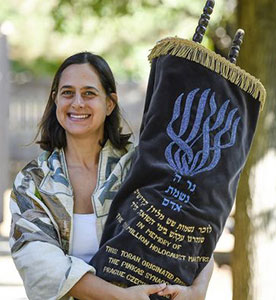Pleasantville Synagogue’s Rabbi Navigates Two Congregations, Difficult Times

The Hebrew words tikkun olam mean to repair the world and are among the many healing words shared by Rabbi Shoshana Leis with her congregation at the Pleasantville Community Synagogue.
Leis became the part-time rabbi at the synagogue in September while still serving a similar role at the Hebrew Congregation of Somers.
“As a rabbi for two communities, it is working out quite well,” Leis said. “When I show up to ea
ch congregation, I’m focusing on each one and being their partner. The congregations are alike and there might be some opportunity to overlap.”
It was a significant development when Leis arrived in Pleasantville.
“It’s a pretty big deal when a synagogue changes rabbis,” said synagogue administrator Marcy Gray. “Rabbi Shoshana Leis, better known as Rabbi Shosh, is a fascinating, warm and engaged individual.”
A Dobbs Ferry resident, Rabbi Leis lives with her husband Ben Newman, also a rabbi, two children, Ari and Isaiah, and two dogs, Toto and Oz. She is a graduate of the Reconstructionist Rabbinical College and Dartmouth College, and she also studied at St. Petersburg University, the Conservative Yeshiva and the Drisha Institute for Jewish Studies.
Leis recently served as director of youth and family education at Romemu, a start-up synagogue in New York City. She and her husband both served for seven years as rabbis at Har Shalom Center for Jewish Living in Fort Collins, Colo.
It is her practice to reach out to other religious and community leaders.
“Building partnerships with fellow clergy and the interfaith councils in Yorktown and Somers is what strengthens us so we can come to a common ground,” Leis said.
Embracing other faiths is evident by Pleasantville Community Synagogue’s weekly meditation sessions or “Jewbu Sangha: Morning Sit.”
“In Buddhism we learn of embedded contemplation and exploration of what’s already there, just like we do in Judaism,” Leis said.
Just as Leis began serving in Pleasantville, she lost her father in a hit-and-run accident. Her father was in excellent health and was on an evening walk with her mother.
“I’ve been very public with my grief process,” Leis said. “I process a lot out loud and it hasn’t felt hard to come in (to serve as rabbi) right after the death of my father. To be in the heart and not leaving part of yourself aside, that’s who I am. It’s about giving other people the opportunity to be vulnerable.”
The Judaic core value of one’s commitment to justice shapes much of Leis’ philosophy as she navigates current political battlegrounds and polarizing issues such as social and emotional health of young people and community diversity.
“We have to find a way to move forward and learn about other political perspectives without compromising and staying true to our core values,” she said. “I have a special interest in the neurodiverse community and the LGBTQ+ community and want to work to build on Pleasantville’s core values of inclusion. Multifaith and LGBTQ+ families need adaptation, curricula and social-emotional support, things religious school tries to provide with small classes that (generally) public schools cannot provide.”
Societal and educational issues are key to Leis who sees how Judaic spiritual tools can especially help young people.
“We’ve learned about mental health and its connection to the uptick in youth suicides,” she said. “Reaching out to communities and their leaders can provide a team model to make sure a child’s spiritual health is tended to consciously and carefully. It does take a village to know what kids need to grow when we are all up against social challenges.”
The numerous lessons from the pandemic have guided us how to live, Leis said.
“We need to take those lessons and animate them into the future for the sake of our own health and wellness,” Leis said. “COVID showed us how to simplify and bring more quality to our lives. The pandemic also showed us the fault lines in our country, our health care policies and the plight of our essential health care workers.”
As the pandemic became more manageable as summer was ending, it was a time that coincided with Rosh Hashana and the Judaic year of Shmita Torah, or “year of release.” That these notable events were concurrent with each other is significant, she explained.
“Shmita Torah is called a sabbatical year where we take a rest, don’t consume and focus on learning, community and connection,” Leis said. “Shmita Torah considers the perspective of getting out on the balcony, looking at our lives and taking reflection.”

Abby is a seasoned journalist who has been covering news and feature stories in the region for decades. Since The Examiner’s launch in 2007, she has reported extensively on a broad range of community issues. Read more from Abby’s editor-author bio here. Read Abbys’s archived work here: https://www.theexaminernews.com/author/ab-lub2019/
